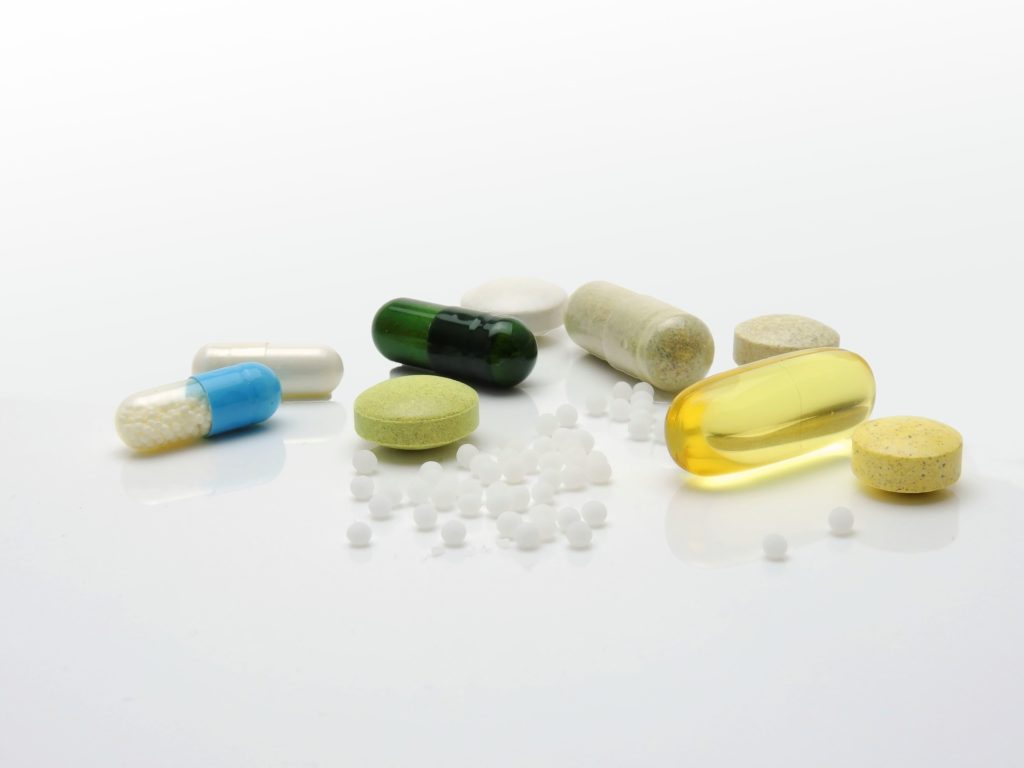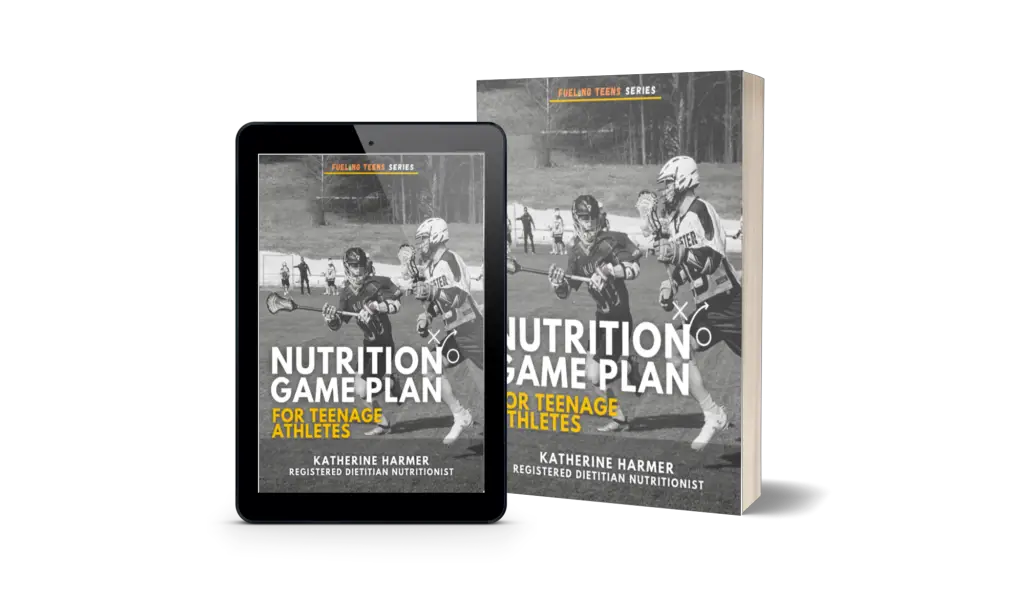Creatine is one of the most popular strength-enhancing supplements used among athletes. It is widely available in health food stores, and anyone can buy it so it must be safe for high schoolers, right?
While 3 in 10 high school athletes have been found to use it, experts from the American Academy of Pediatrics and American College of Sports Medicine say that teenagers should not use creatine or other performance-enhancing supplements. Although it is safe and beneficial in adult athletes, experts agree not enough is known about long term health effects to conclude it is safe for all developing adolescents.
Keep reading to learn more about creatine from a registered dietitian nutritionist: if it is legal in high school sports, benefits and side effects, correct dosage, and more tips for teenage athletes interested in creatine supplements.

What Exactly Does Creatine Do?
Creatine is a nonessential amino acid produced naturally in the body from the liver and kidneys and also from breaking down food (like red meat) into energy.
Muscles store creatine for quick bursts of energy during exercise. Creatine helps form more ATP for explosive movements. More creatine means more potential ATP for short-duration, high-intensity movements (sports requiring short sprints or repeated efforts of maximal exertion).
Does Creatine Actually Help Athletes Gain an Edge on the Playing Field?
Creatine gives short explosive bursts of quick energy that lasts around 10-20 seconds. It can help athletes become stronger and quicker athletes. It doesn’t seem to enhance exercise movements lasting more than 90 seconds.
Creatine can be a pretty effective supplement, when taken correctly. Recent research concludes that some adult creatine users (but not all!) see a 3-5 percent increase in performance over a few months.
This is a small amount compared to physical performance increases during normal growth and development of teenage athletes that are getting bigger, taller, stronger, etc.
Creatine has other benefits besides giving athletes a little more strength and power. It may help enhance glycogen storage and muscle protein synthesis.
Creatine is sport-specific for short explosive movements such as weight lifting or sprinting, other types of exercise use a different energy system . It will help during a sprint, but probably not a marathon. It probably won’t help runners, swimmers, or cyclists, but creatine may help football players, weight lifters, baseball players, or sprinters.
Is Creatine Safe?
Controversy exists surrounding its use. Around 32% of college athletes and and 50%+ of professional football players use creatine. Up to 30% of high school athletes have said they use creatine.
Most people who take it don’t know much about creatine, it’s overall effects, or why they are really taking it. They take it because they heard about it from friends, it’s popular among athletes, it sounds beneficial, and it can be easily purchased in health food stores.
The American College of Sports Medicine advises anyone under the age of 18 from taking creatine due to research, and lack of information on side effects.
See also: Best Supplements for Teenage Athletes
Possible Negative Effects of Creatine for Teenagers
Possible concerns associated from the use of creatine:
- Dehydration
- Cramps
- Stomach problems and discomfort
- Muscle strains and tears
- Nausea
- Seizures
- Kidney and liver problems
- Acute weight gain
These are anecdotal descriptions from athletes. The NCAA has reported many of these concerns in the past from the use of Creatine, however, these results are mixed, some of these effects need to be studied in more detail.
The kidneys can remove creatine when too much is present in the body. Taking too many supplements may overwork and damage kidneys, but not enough on long term effects is known. It seems fairly safe for adults, but this could be dangerous for adolescents who are still developing.
Contaminants:
One of the biggest concerns about teenagers taking creatine is the lack of regulation on products. Supplements aren’t regulated by the FDA very strictly to ensure product safety or effectiveness.
High amounts of harmful contaminants have been found in other supplements, which is a concern for creatine. Creatine products could contain very little creatine, or more of other harmful chemicals for adolescents.
Recommended doses and ingredients are not regulated. Possible side effects could occur from taking a poor quality supplement with harmful additives.
Creatine manufacturers may have fantastic claims about their products, so it’s good to review expert sources as well. You can find reliable dietary supplement information from trusted sources such as the National Institute of Health’s Office of Dietary Supplements.
Proper Nutrition
Diet, not supplements, is the key to success for athletics. Taking shortcuts by consuming performance-enhancing supplements can be dangerous and not always beneficial.
The best source of proper building blocks for muscle growth and performance are through high quality natural sources from real food. By eating a balanced diet, you are getting creatine in the form that your body best needs it. Supplements can sometimes help for an “extra boost”, but shouldn’t be the first go-to.
See also: Nutrition Meal Plan for Teenage Athletes
Is Creatine Legal for High School Athletes?
Creatine studied in adults appears to be safe (when taken correctly) and legal. However, there are few studies in adolescents.
Creatine is legal for high schoolers (double check with local school athletic rules), but controversially because long-term studies on the effects are still lacking. It hasn’t shown to be negative or positive in adolescents. It is an ergogenic aid, but not a steroid. It is not a shortcut to athletic success, but may optimize training benefits.
Teenagers are likely grossly misinformed and receive most of their information from friends, peers, and advertisements. Parents, talk to your teen athlete about creatine and any type of performance-enhancing supplement.
Creatine would likely only bring small improvements, and possible health risks do not outweigh the benefits in adolescents. Teenagers are often under intense pressure in their sport, and trying to gain any type of physical advantage from supplements. Winning is not more important than good health.
A high school athlete’s efforts and money are probably better spent focusing on diet, exercise, and training to achieve athletic goals.

Who Should Take Creatine?
Males and females can take creatine. It may be beneficial to those involved in sports with quick bursts of energy such as sprinting, football, and weights.
If student athletes want to take creatine, it may only optimize their performance if they follow these recommendations:
- Only if they are past puberty
- If they are involved in serious training and exercise for sports
- Eating a well-balanced diet along with it
- Always take correct doses of a high-quality creatine supplement
- Be supervised by parents, coches, trainers, and doctors, etc.
If these conditions are met, it could be reasonable for a high school athlete to take a creatine supplement. It’s a better option than illegal anabolic steroids or other potentially harmful drugs.
Athletic supplements are a multi-billion dollar industry, these companies are in it for the money, and I would still be wary of buying creatine supplements due to the lack of regulations for quality, dose, and ingredients.
Should high schoolers take creatine? During your teenage years, muscles, ligaments, tendons, bones are still developing and forming. Any type of muscle aid might cause injury or negative effects by supplementation. The best thing to do is to exercise regularly and do strength training as you continue to grow.
Most teenage athletes are growing and will notice significant improvements from training and exercising regularly. Creatine is not needed for these individuals.
They wouldn’t recognize it’s effectiveness or need creatine or other supplements. It may be helpful for individuals who are old enough, and who are finding a plateau in their exercise performance and need that extra boost.
Some athletes may have/make enough creatine in their bodies, so they won’t respond to more. It has only been found to benefit some individuals. Also, individuals on a plant-based diet may respond better to creatine supplementation because they may be lacking it from food.
How to Take Creatine:
If your high school athlete decides to take Creatine, make sure they are doing it safely and informed.
- Buy a high quality product in the creatine monohydrate form from a high quality manufacturer. This is the most expensive form, but worth it. Most kids are probably buying a cheap, low-quality blend. You can buy it in capsule form or powder.
- More is not better- take the correct dosage. Never take more than 3-5 grams per day. Manufacturers recommend 20-25 grams per day, but 3-5 grams per day is plenty sufficient to improve muscle levels. Anything above 5-grams may cause problems, or cannot be stored and will just be excreted by the kidneys.
- Creatine absorption appears to be stimulated by insulin, so ingest the supplements with a snack of carbohydrates or protein.
- If you are taking it, make sure you are working with a quality trainer, coach, or doctor who knows how to correctly use it in appropriate doses for teenagers.
- Stop if you recognize any negative or uncomfortable side effects.
- Take 3-5 grams per day for 8-10 weeks then take a month off.
Alternative to Creatine
Most types of supplements should be discouraged by parents and coaches. The top supplements taken by high schoolers are creatine, protein powder, and caffeine stimulants. Creatine is natural and also produced by the body, so may be a better choice of a supplement for adolescents than many others. Whey protein might be a good alternative, and is a fairly safe alternative.
Check out my post: Is Whey Protein Safe for Teenage Athletes? for best tips and suggestions.
Athletes should check in with their doctor and get blood work done to see if everything is normal and healthy before using any supplements. Be sure to let your doctor know of any health conditions you have and other medications and supplements you are taking.
More Related Questions Regarding Creatine:
Is Creatine OK for Teenagers? I often approve of creatine use in adults. I’m hesitant to recommend it to any teenagers due to lack of research and the risk of affecting growing and developing bodies. If you think you need creatine to give you that competitive edge, make sure you are training hard and eating a balanced diet, then we’ll talk.
What Age Can Kids Take Creatine? Again, I would hesitate to recommend creatine to younger athletes. We don’t know if the benefits are helpful or harmful while adolescents are still growing and developing. However, it has been used as a medication for certain health conditions in children and may be safe. I don’t think most children and teenagers need or would benefit from the small improvements that come from creatine. Starting after high school is a safer time to start.
Does Creatine Have Side Effects? There have been anecdotal reported side effects from creatine use such as dehydration, muscle cramps, gastrointestinal discomfort, muscle strains, nausea, seizures, kidney and liver problems, and acute weight gain. Overall, more research is needed.
How Fast Does Creatine Work? After 6-8 weeks of taking an appropriate dose of creatine AND regular strength and conditioning training, you should see a small percentage of increased muscle strength benefits (creatine supplementation may not work for all individuals).
How Much Water Should I Drink with Creatine? Creatine may cause dehydration in some individuals. Focus on water throughout the day and drink a few extra cups of water.
Fueling Teens eBooks
Need more help with your diet this season? Get help from a registered dietitian nutritionist, check out my newest eBook: Nutrition Game Plan for Teenage Athletes
Includes:
- 40+ pages with insightful infographics
- 28-day meal plan to help you eat well and eat right
- Healthy Snack list
- Tips for Gaining or Losing Weight
- Calculations for Daily Calorie Needs, Protein Needs, etc.
- Supplement Recommendations
- Meal Schedule
- …And More
Also available from Fueling Teens:
- FREE Downloadable Meal Plan for Teen Soccer (Football) Players
- Nutrition Game Plan for Teenage Basketball Players
- Nutrition Game Plan for Teenage Football Players
See Also:
- Free Meal Plan for High School Football Athletes
- Is Whey Protein Safe for Teenage Athletes?
- Sugar-Free Kids? The Problem with Artificial Sweeteners for Teens
- Is It Okay for Teens to be Dairy Free?
- The BEST Pre-Workout Meals and Snacks for a Teenage Athlete
References:
Academy of Nutrition and Dietetics. “Supplements and Ergogenic Aids for Athletes.” Written by Sarah Klemm, RDN, CD, LDN October 4, 2018. https://www.eatright.org/food/vitamins-and-supplements/dietary-supplements/supplements-and-ergogenic-aids-for-athletes
Krause’s Mahan, L. Kathleen., et al. Krause’s Food & the Nutrition Care Process. 13th ed., Elsevier, 2012.
By Katherine Harmer, RDN
Fueling Teens is a participant in the Amazon Services LLC Associates Program, an affiliate advertising program designed to provide a means for sites to earn advertising fees by advertising and linking to Amazon.com. We also participate in other affiliate programs which compensate us for referring traffic.

